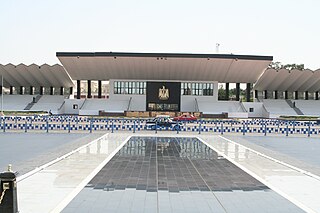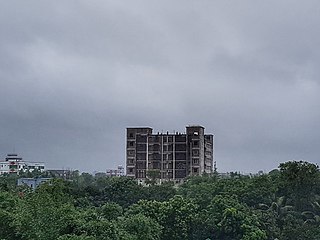Related Research Articles

A gas explosion is the ignition of a mixture of air and flammable gas, typically from a gas leak. In household accidents, the principal explosive gases are those used for heating or cooking purposes such as natural gas, methane, propane, butane. In industrial explosions, many other gases, like hydrogen, as well as evaporated (gaseous) gasoline or ethanol play an important role. Industrial gas explosions can be prevented with the use of intrinsic safety barriers to prevent ignition, or use of alternative energy.

Egyptian National Railways is the national railway of Egypt and managed by the parastatal Egyptian Railway Authority.

Terrorism in Egypt in the 20th and 21st centuries has targeted the Egyptian government officials, Egyptian police and Egyptian army members, tourists, Sufi Mosques and the Christian minority. Many attacks have been linked to Islamic extremism, and terrorism increased in the 1990s when the Islamist movement al-Gama'a al-Islamiyya targeted high-level political leaders and killed hundreds – including civilians – in its pursuit of implementing traditional Sharia law in Egypt.

The persecution of Copts and discrimination against Coptic Orthodox Christians are historic and widespread issues in Egypt. Their treatment is indicative of the poor status of Christians in the Middle East more widely, despite the fact that the religion is native to the Middle East, and that Christianity in Egypt dates back to the Roman era. Copts are the indigenous Christians in Egypt, usually Oriental Orthodox, who currently make up 10% of the population—the largest religious minority of that country. Copts have cited instances of persecution throughout their history and Human Rights Watch has noted "growing religious intolerance" and sectarian violence against Coptic Christians in recent years, as well as a failure by the Egyptian government to effectively investigate properly and prosecute those responsible. However, as political violence is common many churches believe that the attacks against the church are not religious statements, instead political statements. Since 2011, hundreds of Egyptian Copts have been killed in sectarian clashes, and many homes, churches and businesses have been destroyed. In just one province (Minya), 77 cases of sectarian attacks on Copts between 2011 and 2016 have been documented by the Egyptian Initiative for Personal Rights. The abduction and disappearance of Coptic Christian women and girls also remains a serious ongoing problem.

The Cairo fire, also known as Black Saturday, was a series of riots that took place on 26 January 1952, marked by the burning and looting of some 750 buildings—retail shops, cafes, cinemas, hotels, restaurants, theatres, nightclubs, and the city's Casino Opera —in downtown Cairo. The direct trigger of the riots was the Battle of Ismailia, an attack on an Egyptian police installation in Ismaïlia by British forces on 25 January, in which roughly 50 auxiliary policemen were killed.

The Sinai insurgency was an insurgency campaign in the Sinai Peninsula of Egypt launched by Islamist militants against Egyptian security forces, which also included attacks on civilians. The insurgency began during the Egyptian Crisis, during which the longtime Egyptian president Hosni Mubarak was overthrown in the 2011 Egyptian revolution.

The 2012 Dhaka garment factory fire broke out on 24 November 2012, in the Tazreen Fashion factory in the Ashulia district on the outskirts of Dhaka, Bangladesh. At least 117 people were confirmed dead in the fire, and over 200 were injured, making it the deadliest factory fire in the nation's history. The cause of the fire was not determined. It was initially presumed to be caused by an electrical short circuit, the cause of 80% of factory fires in Bangladesh. A widely criticized government report alleged an act of "sabotage", without identifying who committed it or why. This fire and others similar to it have led to numerous proposed reforms in workers' rights and safety laws in Bangladesh.

The Rana Plaza collapse occurred on 24 April 2013, when the eight-storey Rana Plaza commercial building collapsed due to a structural failure. The search for survivors ended on 13 May 2013, with a confirmed death toll of 1,134. Approximately 2,500 injured people were rescued from the building. It is considered to be one of the deadliest structural failures in modern human history, as well as the deadliest garment-factory disaster in history, and is the deadliest industrial accident in the history of Bangladesh. Amnesty International called it "the most shocking recent example of business-related human rights abuse."

Protests against the 2013 Egyptian coup d'état erupted in July 2013. Immediately following the removal of President Mohamed Morsi by the Egyptian Armed Forces on 3 July 2013 amid demonstrations against Morsi's rule, many protesters amassed near the Rabia Al-Adawiya Mosque to call for Morsi's return to power and condemn the military, while others demonstrated in support of the military and interim government. Deadly clashes such as Rabaa massacre continued for several days, with three particularly bloody incidents being described by officials as "massacres" perpetrated by security forces. During the month of Ramadan, prime minister Hazem al-Beblawy threatened to disperse the ongoing Pro-Morsi sit-ins in Rabaa al-Adaweya square and al-Nahda square. The government crackdown of these protests occurred in a violent dispersal on 14 August 2013. In mid-August, the violence directed by the army towards the protesters escalated, with hundreds killed, and the government declaring a month-long nighttime curfew.

The Islamic State – Sinai Province was a branch of the jihadist organization Islamic State that was active in the Sinai Peninsula of Egypt.

In July 2013, at the same time as mass protests began against the 3 July coup d'état which deposed Mohamed Morsi, and in parallel with the escalation of the already ongoing jihadist insurgency in the Sinai Peninsula, pro-Muslim Brotherhood militants started violent attacks against policemen and soldiers in central and western Egypt. In the following months, new Islamist armed groups were created to reinstate Islamist rule in Egypt, like Soldiers of Egypt and the Popular Resistance Movement. Since 2013, violence in mainland Egypt has escalated and developed into a low-level Islamist insurgency against the Egyptian government.
Events in the year 2021 in Egypt.
On 18 April 2021, a train derailed in the city of Toukh in Qalyubiyya Governorate, Egypt. The accident left 23 people dead and another 139 injured, trapping several under overturned carriages. It was the third major train accident in Egypt recorded in less than a month. Considering the commonality of train wrecks and mishaps in Egypt, prosecutors blamed the negligence of railway employees and the country’s mismanagement.
Events in the year 2022 in Egypt.
On 14 August 2022, a fire broke out at the Abu Sefein Church, a Coptic Christian Orthodox church in the Imbaba neighborhood of Giza on the outskirts of Cairo, Egypt. The fire started during Sunday worship services when nearly 5,000 worshippers were gathered. The fire, which investigations found started due to a faulty air-conditioning unit, spread to a nursery the church hosted, killing 41 people in total throughout the complex, including at least 18 children. One of the church's priests, Abdul Masih Bakhit, was among those who died in the fire.
References
- 1 2 3 "Egypt: Garment factory fire kills at least 20". Deutsche Welle . 11 March 2023.
- ↑ "Egypt: At least 20 dead in Cairo clothing factory fire". Al Jazeera English. 11 March 2021. Retrieved 11 March 2021.
- ↑ "Garment factory fire kills at least 20 in Egypt". Reuters. 11 March 2021. Retrieved 11 March 2021.
- ↑ "Twenty dead, 24 injured in factory fire outside Cairo". Egypt Independent. 2021-03-12. Retrieved 2023-10-15.
- ↑ "ارتفاع حصيلة ضحايا حريق بمصنع شمال القاهرة إلى 20 قتيلا" [The death toll from a fire in a factory north of Cairo has risen to 20]. New China News Agency (in Arabic). 12 March 2021.
- ↑ "Fire at garment factory in Egypt kills at least 20 people, officials say". The Globe and Mail. Associated Press. 2021-03-11. Retrieved 2023-10-15.
- ↑ Al-Khatib, Ahmed (2023-10-02). "حريق مديرية أمن الاسماعيلية: وزارة الداخلية المصرية بصدد التحقيق في الأسباب التي أدت إلى الحريق الهائل" [An advisory committee to investigate the causes of the “burning” of the Ismailia Security Directorate building in Egypt]. BBC News عربي (in Arabic). Retrieved 2023-10-15.
- ↑ Kavilanz, Parija (2022-01-28). "A jump in factory fires is dangerous for the people who work there - and the supply chain". CNN. Retrieved 2023-10-15.